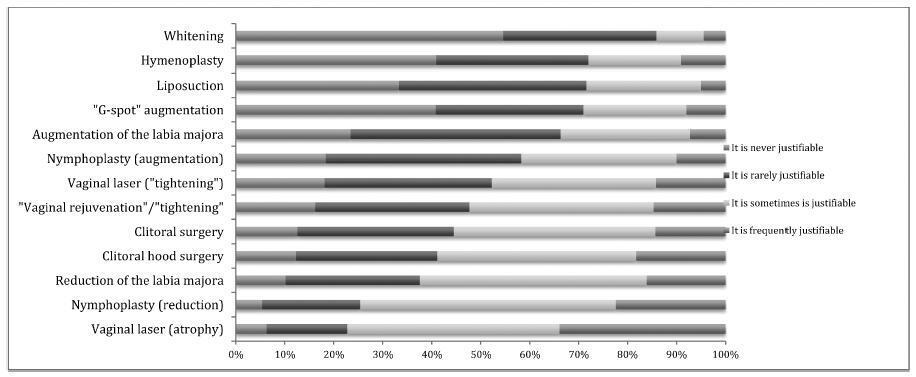Revista Brasileira de Ginecologia e Obstetrícia. 08-01-2017;39(8):415-423


To assess themedical doctors andmedical students’ opinion regarding the evidence and ethical background of the performance of vulvovaginal aesthetic procedures (VVAPs).
Cross-sectional online survey among 664 Portuguese medical doctors and students.
Most participants considered that there is never or there rarely is amedical reason to perform: vulvar whitening (85.9% [502/584]); hymenoplasty (72.0% [437/607]); mons pubis liposuction (71.6% [426/595]); “G-spot” augmentation (71.0% [409/576]); labia majora augmentation (66.3% [390/588]); labia minora augmentation (58.3% [326/559]); or laser vaginal tightening (52.3%[313/599]).Gynecologists and specialistsweremore likely to consider that there are no medical reasons to performVVAPs; the opposite was true for plastic surgeons and students/residents. Hymenoplasty raised ethical doubts in 51.1% (283/554) of the participants. Plastic surgeons and students/residents were less likely to raise ethical objections, while the opposite was true for gynecologists and specialists. Most considered that VVAPs could contribute to an improvement in self-esteem(92.3% [613/664]); sexual function (78.5% [521/664]); vaginal atrophy (69.9% [464/664]); quality of life (66.3% [440/664]); and sexual pain (61.4% [408/664]).
While medical doctors and students acknowledge the lack of evidence and scientific support for the performance of VVAPs, most do not raise ethical objections about them, especially if they are students or plastic surgeons, or if they have had or have considered having plastic surgery.
Search
Search in:


Comments